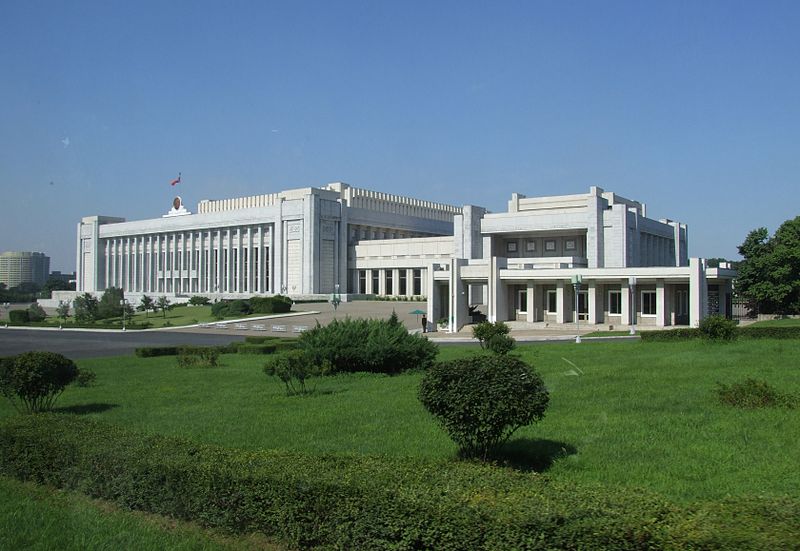The North Korean rubber stamp parliament held a session this week to pass legislation aimed at turning the isolated nation into a “socialist fairyland.” Lawmakers in session adopted legislation for the country’s rural development and landscaping.
North Korean state media KCNA reported Thursday that the North Korean Supreme People’s Assembly convened for its first session Wednesday, passing laws aimed at landscaping and rural development.
The two laws will advance the ruling Workers Party’s efforts to bring significant change to the rural community and the law on landscaping would “achieve a rapid development of the Korean-style socialist rural community and spruce up the country into a beautiful and civilized socialist fairyland,” according to a deputy.
North Korean leader Kim Jong-un was not present during the session but has previously vowed to improve the North Korean people’s livelihoods and bolster rural development in the face of an economic crisis caused by the COVID-19 pandemic, natural disasters, and international sanctions due to the nation’s nuclear program.
Analysts say that Kim has yet to deliver on many of his economic promises as aid organizations warned of food shortages and other hardships. In a report by 38 North, Kim’s pledge to rebuild a province devastated by the typhoon to transform it into a model mining community has seen little progress.
The United States has also accused North Korea of using its resources for military projects instead of helping its people. Washington has also alleged that Pyongyang was selling arms and ammunition to Russia to help Moscow in its war with Ukraine.
Aside from laws to further develop and beautify the nation, the North Korean parliament also passed legislation that would grant the nation the right to use pre-emptive nuclear strikes to defend itself. Kim said the move would make its nuclear weapons status “irreversible” and would prevent any denuclearization talks, according to KCNA Friday.
The new law also comes as the US, South Korea, and Japan have expressed concerns that Pyongyang was gearing up for its first nuclear test since 2017. The legislation replaced a 2013 law that outlined the country’s nuclear status.
“The utmost significance of legislating nuclear weapons policy is to draw an irretrievable line so that there can be no bargaining over our nuclear weapons,” said Kim in remarks to the assembly, adding that he has no plans to surrender the weapons even if the country faces 100 years of sanctions.



 Spain Denies Deal With U.S. Military After Trump Threatens Trade Cutoff
Spain Denies Deal With U.S. Military After Trump Threatens Trade Cutoff  Rubio, Saudi Foreign Minister Discuss Iran Threats and U.S. Embassy Riyadh Attack
Rubio, Saudi Foreign Minister Discuss Iran Threats and U.S. Embassy Riyadh Attack  Middle East Air War Triggers Massive Flight Cancellations and Global Airline Disruptions
Middle East Air War Triggers Massive Flight Cancellations and Global Airline Disruptions  U.S. Preparing Possible Corruption Charges Against Venezuelan President Delcy Rodriguez
U.S. Preparing Possible Corruption Charges Against Venezuelan President Delcy Rodriguez  Michael Whatley Wins North Carolina GOP Senate Primary, Setting Up High-Stakes Battle With Roy Cooper
Michael Whatley Wins North Carolina GOP Senate Primary, Setting Up High-Stakes Battle With Roy Cooper  Trump Offers U.S. Insurance and Naval Escort for Tankers as Strait of Hormuz Crisis Disrupts Global Oil Trade
Trump Offers U.S. Insurance and Naval Escort for Tankers as Strait of Hormuz Crisis Disrupts Global Oil Trade  Trump Praises Delcy Rodríguez as Venezuela Oil Exports Resume
Trump Praises Delcy Rodríguez as Venezuela Oil Exports Resume  Big Tech Signs White House Pledge to Fund Power for AI Data Centers
Big Tech Signs White House Pledge to Fund Power for AI Data Centers  U.S. Military Strikes on Iran Complicate Xi-Trump Summit and Expose China’s Energy Risks
U.S. Military Strikes on Iran Complicate Xi-Trump Summit and Expose China’s Energy Risks  US Lawmakers Raise Security Concerns Over Intel Testing ACM Research Chipmaking Tools
US Lawmakers Raise Security Concerns Over Intel Testing ACM Research Chipmaking Tools  Nepal General Election 2026: Youth Protests, Political Change, and a New Generation of Voters
Nepal General Election 2026: Youth Protests, Political Change, and a New Generation of Voters  Santander’s $12.2B Webster Financial Deal Faces Uncertainty Amid U.S.–Spain Trade Tensions
Santander’s $12.2B Webster Financial Deal Faces Uncertainty Amid U.S.–Spain Trade Tensions  Trump Defends Extended U.S.-Israel Military Campaign Against Iran
Trump Defends Extended U.S.-Israel Military Campaign Against Iran  Iran Crisis Could Threaten AI Data Center Expansion and Global Chip Demand, South Korea Warns
Iran Crisis Could Threaten AI Data Center Expansion and Global Chip Demand, South Korea Warns  U.S. Senate Rejects War Powers Resolution Aimed at Halting Trump’s Military Campaign Against Iran
U.S. Senate Rejects War Powers Resolution Aimed at Halting Trump’s Military Campaign Against Iran  Trump and Merz Meet at White House Amid Iran Strikes and Trade Tensions
Trump and Merz Meet at White House Amid Iran Strikes and Trade Tensions  U.S. Officials Review Tencent’s Stakes in Epic Games, Riot Games Over Security Concerns
U.S. Officials Review Tencent’s Stakes in Epic Games, Riot Games Over Security Concerns 



























